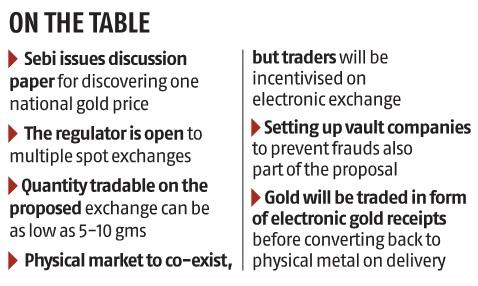Proposal for Gold Exchange | 18 May 2021
Why in News
The Securities and Exchange Board of India (SEBI) has proposed a framework for setting up a spot gold exchange.
- The spot exchange is where financial instruments, such as commodities, currencies, and securities, are traded for immediate delivery.
- SEBI is a statutory body established in April, 1992 in accordance with the provisions of the Securities and Exchange Board of India Act, 1992.
Key Points
- Framework of Gold Exchange:
- In the first tranche, an entity desirous of delivering gold, locally manufactured or imported, on the exchange platform would have to approach a SEBI regulated vault manager and deposit physical gold meeting quality and quantity parameters with it.
- Against this, the vault manager will issue an EGR (Electronic Gold Receipt), which will be tradeable on the exchanges, in the second tranche.
- A beneficial owner will surrender the EGR to a vault manager and take delivery of the gold in the third tranche.
- A common interface will be developed between vault managers, depositories, clearing corporations and stock exchanges to enable seamless execution of the three tranches.
- The proposed denominations - reflecting underlying physical gold - of EGRs are 1 kilogram, 100 gram, 50 gram and subject to conditions, those can also be even for 5 and 10 gram.
- STT (Security Transaction Tax) will be levied on trading of the EGR and IGST (Integrated Goods and Services Tax) at the time of delivery.
- Other Issues Raised by SEBI:
- This includes fungibility and interoperability between vault managers.
- Fungibility means gold deposited under, say, EGR 1 can be delivered against surrender of EGR 2 meeting the same contract specifications.
- Interoperability means gold deposited at one location and with one vault manager can be withdrawn from a different location of the same or different vault manager, subject to availability of the physical gold. This will reduce the cost for buyers.
- Reason for Creating Separate Exchange for Gold:
- To create a vibrant gold ecosystem in India which is commensurate with its large share of global gold consumption.
- India (after China) is the second largest consumer of gold globally, with annual gold demand of approximately 800-900 tonnes, and holds an important position in the global markets.
- The objective behind setting up gold exchanges is for India to become a price setter rather than a price taker and to establish an India good delivery standard, akin to London Bullion Market Association (LBMA) accredited gold bars.
- Setting up a new stock spot gold exchange has advantages such as single good delivery standard, reduced market fragmentation, improved liquidity, and single reference price.

